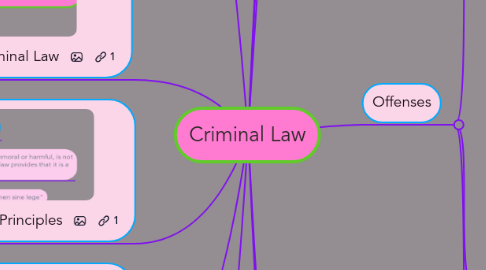
1. Sources of Criminal Law
1.1. Common Law
1.1.1. Developed through history, but has an English law basis
1.1.2. Basis of ALL crimes, statutes, etc.
1.1.3. At common law, Federal Crimes did NOT exist
1.2. Model Penal Code (MPC)
1.2.1. Developed by the American Law Institute (ALI) as the ideal form of the law
1.2.1.1. Intended to provide a reasoned, integrated body of material that will bill useful in such legislative efforts
1.2.2. Must be adopted by the jurisdiction to be applicable
1.2.2.1. Not one state has adopted in its entirety, rather just sections of the code.
1.2.3. Contains 4 distinct provisions
1.2.3.1. General principles of, existence of, and scope of liability
1.2.3.2. Definition of specific offenses
1.2.3.3. Provisions which govern the process of treatment and correction
1.2.3.4. Provisions on the organization of corrections.
1.3. Codified Law/Statutory Interpretation
1.3.1. Statutes are Developed by the Legislature.
1.3.1.1. Contain ambiguity. In the event the meaning cannot be ascertained, then the court will rely on the common law to determine the meaning of the statute.
1.3.2. Varies by jurisdiction (Each state passes their own statutes)
1.3.3. Federally, congress passes any federal crimes.
1.4. US shifts the burden of law making from the courts to the legislature. This makes the law creation more representative of the people
2. Purpose of Criminal Law
3. Important Principles
4. Nature of Criminal Law
5. Criminal liability requires the guilty hand, moved by the guilty mind, under the required circumstances that sometimes causes a bad result in the absence of a justification or excuse
5.1. The Guilty Hand
5.1.1. Felony: Crime punishable by death or state prison
5.1.2. Actus reus
5.1.2.1. An act- a bodily movement, a muscular contraction
5.1.2.2. the act must be voluntary
5.1.3. The doing part of the crime
5.1.3.1. All Crimes require some sort of action
5.1.3.1.1. no such thing as "thought crimes"
5.2. The Guilty Mind
5.2.1. Criminal law relies heavily on the definitions of different states of mind to determine whether a crime has occurred at all and to distinguish from less serious crimes
5.2.1.1. Even if the defendant performs the conduct required for the crime, she will not be guilty if she does not perform the conduct required with the mental state
5.2.2. Mens Rea
5.2.2.1. Literally the guilty mind
5.2.2.2. Act does not make a person guilty unless the mind be guilty
5.2.2.3. Except in rare circumstances, a person is not guilty of a criminal offense unless the government proves the actus reus and the mens rea
5.3. Required Circumstances
5.3.1. phrase refers to what is more formally described as the attendant circumstances of a crime.
5.3.2. Some crimes require certain circumsantces to exist in order for the crime to take pace
5.4. Sometimes Causing A Bad Result
5.5. In the Absence of a Justification or Exscuse
5.5.1. Certain general defenses may preclude liability even if all elements are present
6. Modern Law, Criminal Sexual Conduct
6.1. Attempted to eradicate issues with common law rape definition
6.2. MICHIGAN CSC Law
7. Consolidation of the Theft Crimes
8. Elements of a Crime
9. Offenses
9.1. Inchoate Offenses
9.1.1. Consipiracy
9.1.1.1. the dwelling
9.1.1.2. Modernly
9.1.1.2.1. An agreement between two or more parties to commit an illegal act or to commit a legal act through illegal means, and commission of an overt act in furtherance of the conspiracy
9.1.1.2.2. Specific Intent Crime
9.1.1.2.3. Majority rule
9.1.1.3. Forms of Conspiracy
9.1.1.3.1. Chain
9.1.1.3.2. Wheel or Hub
9.1.2. Solicitation
9.1.3. Accomplice Liability
9.2. Offenses
9.2.1. Homicide
9.2.2. Common Law Rape
9.2.2.1. Elements
9.2.2.1.1. Unlawful carnal knowledge
9.2.2.1.2. of a woman who is not his wife or by a child under 10 years of age
9.2.2.1.3. Against her will
9.2.2.1.4. By force or threat of force
9.2.2.2. General intent crime, merely the act of attempting the rape is sufficient.
9.2.3. Rape
9.2.4. Battery
9.2.4.1. Element
9.2.4.1.1. Breaking
9.2.4.1.2. entering
9.2.4.1.3. of another
9.2.4.1.4. at night
9.2.4.1.5. with intent to commit a felony therein
9.2.5. Assault
9.2.6. Kidnapping
9.2.7. Arson
9.2.8. Burglary
9.2.9. Robbery
9.2.10. Theft Crimes
9.2.10.1. Common Law
9.2.10.1.1. Larceny
9.2.11. Embezzlement
9.2.12. False Pretenses
9.3. Strict Liability
10. Defenses
11. Classification of Crimes
11.1. Felony v. Misdemeanor
11.2. Malum In Se v. Malum Prohibitum,
11.2.1. Malum In Se: Wrong in themselves, Inherently evil
11.2.1.1. Typically Common Law Crimes
11.2.1.1.1. Usually has jail time
11.2.2. Misdemeanor: All other crimes (punishable by fines or local imprisonment)
11.2.3. Malum Prohibitium: Wrong only because legislation prohibits.
11.2.3.1. Typically those of strict liability with only fines and minimal jail
11.2.4. Lack mens rea
